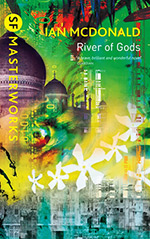
![]() couchtomoon
couchtomoon
7/8/2015
![]()
Rich in content, dazzling in delivery, McDonald's 2004 collage of near-future India is a deeper pre-echo of its 2010 sibling The Dervish House: a multi-character exploration of culture and high-tech speculations that clash amidst an urban heat wave. Less friendly, with less charm and more grit than The Dervish House, there's no cute little boy with his toy bot to sweeten the plot when things get ugly.
As with all culture novels written by an outsider, the outsider reader must go in with hesitation; this cannot be the book to define India, no matter how well-rounded and respectful its depiction may appear. This can only be a book to define McDonald's visions of technological and social evolution in a third-world society.
It's the year 2047, the centennial of Indian Independence, although the subcontinent as we know it has fragmented into independent states. War and unrest over water shortages threaten diplomatic and social peace, while American combat bots populate the city streets to enforce order. In the city of Varanasi, a holy site on the Ganges River, the sweltering urban atmosphere is a pressure cooker of various lifestyles, political corruption, and the debris of technological leaps.
Lots of slightly related strands weave the tight and fluid foundation of this tale. We meet an AI-hunting cop, his bored housewife, a comedian-turned-businessman, a low-life criminal, two AI scientists (one in space), an independent journalist, high ranking politicians, a third-gendered "nute," and a strange teen girl who can stop robot armies with one hand. Each strand touches on the others in gentle wisps--sometimes not noticed until later--but all circle the primary mystery that swirls the notions of gods and artificial intelligence into clever and coherent ruminations about the nature of super-intelligence.
The thematic struggle that possesses India also grips each character, touched upon by the kitschy soap opera Town & Country, which seems to play in the background of every character strand. Town & Country,though we learn little about it, the title says much, and serves as McDonald's impression of the cultural mindset as he sees it: a nation uneasy with its past, present, and future. No one feels at home within their personal network. No one feels at home within themselves. Daily life may be routine, yet within their psyche is a struggle for identity, discovery, and self-acceptance. While India tries to reconcile its ancient myths and early modern hierarchies with postmodern innovation, each character struggles with their own personal mythology and revolution. The ingredients don't blend well. Persona and culture are but fragments of past and future trying to live together as one, but they only cause friction.
Thematically consistent, but is it a viable depiction? While McDonald's characters are bold, diverse, and strong enough to endure these struggles, McDonald's India appears as a passive recipient of technology that, more often than not, surpasses social understanding. In this case, McDonald's India is inhabited by American Urban Combat Robots (UCRs), which act as law enforcement, debt collectors, (possibly traffic cops, because although the text never said so, this is how I picture the street scenes and that's what makes McDonald's world-building so brilliant and economical--his narrative plants seeds that grow in the reader's imagination). And while there is much talk within many of the subplots about whether robots have gods, and while the robots and aeai (that's A.I.) seem to have molded to Indian society with their bindis and soap opera credits, we still get the sense that technology happens to India, but not the other way around.
This seems a bit out-of-character for India, and most of the third world, where the combination of poverty-induced creative engineering, petty street crime, and the student class (before they are recruited to the first-world via the "brain drain") would likely coalesce into, not just an underground aeai industry run by one mobster, but an entire subculture of youths who dismantle, refurbish, and reprogram UCRs for their own amusement. Where is the practical tinker industry? Where is the refurbished Urban Combat Robot with the filed off serial number that washes dishes in the back of the Tikka Pasta Inc. restaurant?
But although it's not the India I expected to see, and maybe not India as it is or will be, it's certainly an India worth seeing. McDonald's vision is majestic and bold, the tale is ambitious and successful (and how often do we get say both?), and his writing, what I've come to expect, is dazzling. And the story itself is suspended on a much loftier hypothesis than any other novel that dares to use the word "singularity," (which this one doesn't, so that's another plus).
*ebook spyglass searches*
Oh, shit. It does use the world "singularity." But only four times, so that's practically nothing. But it does bring up a lovely flavor quote I forgot about:
Aj toys with a twist of marigold petals.
"Have we reached the singularity?"
Thomas Lull starts at the abstruse work falling like a pearl from Aj's lips.
"Okay mystery girl, what do you understand by singularity?" (loc. 4740)
Although the audiobook version is good, it's not recommended over the text. McDonald's prose is so, let's say it again, dazzling, it's best experienced with eyes over ears to truly appreciate his work.
http://couchtomoon.wordpress.com